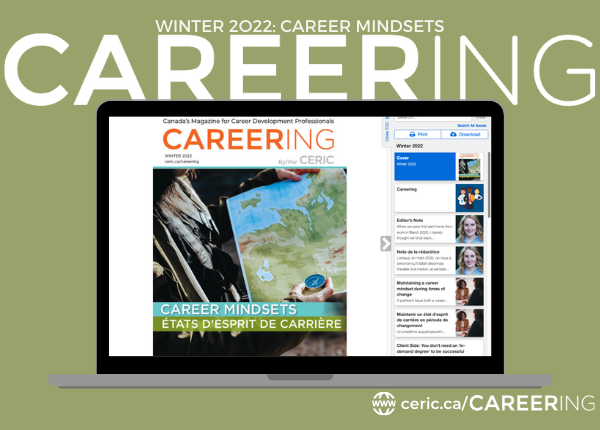
Lynne Bezanson honoured with Wileman Award for her remarkable achievements
January 31, 2022
Winter issue of Careering magazine shines a light on career mindsets
February 2, 2022CERIC uncovers keen insights on top challenges Canadian businesses face during ever-evolving pandemic and how career development can increase Canada’s economic growth
TORONTO, ON (February 1, 2022) — There is a vaccine to champion recruitment and retention in the wake of “The Great Reshuffle.” It’s called career development.
A national survey [i] recently conducted by Environics for CERIC — a Canadian charitable organization that advances education and research in career counselling and career development — reveals that the majority of Canadian executives (81 per cent) are having difficulty finding people with the right skill set to fill positions and 78 per cent agree there is a skills gap in their respective industry.
“The ongoing pandemic and underlying economic uncertainty have Canadian executives experiencing significant difficulties and pain points including recruiting, hiring and retaining talent,” says André Raymond, CRHA, Laval University and Chair of the Board of Directors, CERIC. “Canadian businesses can play a significant role in addressing these shifting labour challenges by investing in career development that will address the skills shortage, contribute to economic growth and demonstrate their commitment to build a strong future skilled workforce.”
CERIC surveyed 500 Canadian executives in more than 11 industries including service, retail, hospitality, construction and manufacturing. The survey reveals keen insights into Canadian organizations’ current views on skills and talent gaps in the labour market; hiring underrepresented groups as part of equity, diversity and inclusion strategies; and the importance of investing in career development. The survey also provides comparability to CERIC’s 2013 survey to track differences within the past eight years.
Top Challenges for Canadian Businesses
Since 2013, executives are less concerned about the state of the economy, regulation & red tape and keeping up with technology. In this fluid pandemic landscape and underlying uncertainty, the challenge of finding young & skilled talent has increased in the past eight years. The top five challenges faced by employers are:
- A shortage of skilled workers (75 per cent vs 68 per cent in 2013)
- Finding young workers (66 per cent vs 51 per cent in 2013)
- Supply chain issues (70 per cent)
- General state of the economy (69 per cent vs 77 per cent in 2013)
- Regulation and red tape (52 per cent vs 63 per cent in 2013)
While employers in Ontario were the least likely to experience a shortage of skilled workers in 2013, they are now the most likely (81 per cent in 2021 vs 59 per cent in 2013), followed by executives in Quebec (76 per cent vs 77 per cent in 2013) and the Prairies (76 per cent vs 69 per cent in 2013).
Recruiting & Retaining Talent
Eighty-one per cent of Canadian executives are having difficulty finding people with the right skill set to fill positions in their companies — up from 70 per cent in 2013. Additional difficulties include:
- Finding reliable candidates with the right work ethic (29 per cent)
- Competitive job market in their respective industry (23 per cent)
While the importance of resumes has not deviated significantly since 2013, executives are finding a potential employee’s online footprint to be increasingly important (63 per cent vs 52 per cent in 2013).
Despite the growing importance of equity, diversity and inclusion, there has been a modest increase in the proportion of executives putting effort into customizing their recruitment approaches to attract and reach members of underrepresented groups (51 per cent vs 46 per cent in 2013).
“Compared to the pre-pandemic era, Canadian executives are now facing increased competition to recruit talent and one-third of executives find retaining employees to be more difficult compared to two years ago,” says Candy Ho, inaugural Assistant Professor, Integrative Career and Capstone Learning, University of the Fraser Valley and Vice-Chair, CERIC. “To compete, it’s imperative for employers to take strategic actions and find ways to differentiate the value proposition they offer to current and prospective workers.”
“Career development is an essential strategy for recruiting, developing and retaining productive and satisfied employees,” adds Ho. “This approach can address major challenges that employers face today. From finding underrepresented talent to providing career coaching to employees, companies can positively build a stronger workforce and contribute to Canada’s economic growth.”
Take a Hard Look at Soft Skills
Executives who have experienced more difficulty in employee retention (72 per cent) more often identify a skills gap in their industry (42 per cent) and are finding it increasingly more difficult to recruit people with the soft skills they deem important (40 per cent). While positive attitude and good communication skills continue to be seen as the two most important soft skills for prospective employers, the importance of reliability and dependability has increased by more than 100 per cent:
- Positive attitude (29 per cent vs 36 per cent in 2013)
- Communication skills (22 per cent vs 29 per cent in 2013)
- Reliability and dependability (21 per cent vs 9 per cent in 2013)
- Strong work ethic (18 per cent vs 23 per cent in 2013)
- Teamwork skills (16 per cent vs 25 per cent in 2013)
Many career development experts suggest soft skills are gaining the upper hand over hard skills. Occupations requiring good social skills are becoming more common and have even been described as critical for the future of work. The survey revealed executives are most likely to hire someone with soft skills who is a good fit and provide training (78 per cent).
The federal government has also taken action to prioritize soft skills with Employment and Social Development Canada (ESDC) looking at ways of improving the Essential Skills Framework. In 2021, they released the Skills for Success [ii] which includes communication; creativity & innovation; problem solving; and adaptability, to name a few.
“Employers are increasingly looking for candidates with hybrid skills, which are a combination of soft and hard skills,” says Ho. “Canadians have the opportunity to develop and implement skills that might set them apart from other candidates. These new skills will also make them more effective at their current jobs and let them quickly adapt to changing industries and apply their skills and talents toward a fulfilling career.”
Investing in Career Development to Close the Skills Gap
While 73 per cent agree employers have a responsibility to provide career management programs for employees, only 27 per cent provide these programs and 45 per cent were unaware of career development professionals before this survey.
“Canadian executives have the unique opportunity to help Canadians take charge of their career by investing in development strategies that help employees identify personal strengths and clarify career goals that can positively contribute to job satisfaction,” says Raymond. “Working with a career professional can support organizations to build strategies that meet company needs and improve employee engagement, which ultimately leads to increased productivity, positive relationships, job clarity and a supportive work environment.”
Cannexus Conference – January 24-26, 2022
About CERIC
CERIC is a charitable organization that advances education and research in career counselling and career development, in order to increase the economic and social well-being of Canadians. It funds projects to develop innovative resources that build the knowledge and skills of diverse career professionals; annually hosts Cannexus; and publishes the country’s only peer-reviewed academic journal in the field, Canadian Journal of Career Development. For more information, visit www.ceric.ca
To arrange an interview with a CERIC board member and industry expert or for more information, please contact: Sonia Prashar or Bronlynn Carrington at spPR Inc. soniaprashar@sppublicrelations.com I bronlynncarrington@sppublicrelations.com
[i] From November 18 – December 17, 2021, Environics conducted a national telephone survey among 501 randomly selected Canadian businesses. Interviews were conducted with senior level employees with awareness of, and responsibility for hiring, training and career development within the organization. Quotas were monitored to ensure that a minimum number of interviews were conducted within each region of Canada. The sample was designed to conduct interviews with senior staff of businesses across Canada, of various sizes, location (urban, rural and suburban), and industries. The margin of error is ± 4.4 percentage points, at the standard 95% confidence level. [ii] https://careerwise.ceric.ca/2021/06/28/what-you-need-to-know-about-canadas-new-skills-for-success-framework/#.YdiPK2jMLIU
